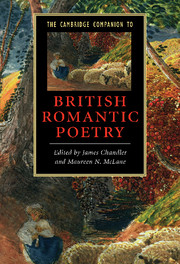Book contents
- Frontmatter
- Introduction: The companionable forms of Romantic poetry
- 1 The living pantheon of poets in 1820: pantheon or canon?
- 2 Romantic poetry and antiquity
- 3 Romantic meter and form
- 4 Romantic poetry and the standardization of English
- 5 Thinking in verse
- 6 Romantic poetry and the romantic novel
- 7 Wordsworth’s great Ode: Romanticism and the progress of poetry
- 8 Romantic poetry, sexuality, gender
- 9 Poetry, peripheries and empire
- 10 Romantic poetry and the science of nostalgia
- 11 Rethinking Romantic poetry and history: lyric resistance, lyric seduction
- 12 The medium of Romantic poetry
- 13 Romantic poets and contemporary poetry
- Index
- Series List
6 - Romantic poetry and the romantic novel
Published online by Cambridge University Press: 28 November 2008
- Frontmatter
- Introduction: The companionable forms of Romantic poetry
- 1 The living pantheon of poets in 1820: pantheon or canon?
- 2 Romantic poetry and antiquity
- 3 Romantic meter and form
- 4 Romantic poetry and the standardization of English
- 5 Thinking in verse
- 6 Romantic poetry and the romantic novel
- 7 Wordsworth’s great Ode: Romanticism and the progress of poetry
- 8 Romantic poetry, sexuality, gender
- 9 Poetry, peripheries and empire
- 10 Romantic poetry and the science of nostalgia
- 11 Rethinking Romantic poetry and history: lyric resistance, lyric seduction
- 12 The medium of Romantic poetry
- 13 Romantic poets and contemporary poetry
- Index
- Series List
Summary
Readers interested in the relationship between poetry and the novel in the Romantic period have long been charmed by the scene of the autumnal walk in Jane Austen's Persuasion (1818). Keeping each other begrudging yet compulsive company, the extended family circle at Uppercross sets out on a “long walk,” and Anne Elliot must once again witness at close hand the flirtations of her beloved Captain Wentworth and the Musgrove sisters. Finding pleasure in this walk requires a deliberate effort on Anne's part: she thus turns to the mental discipline of “repeating to herself some few of the thousand poetical descriptions extant of autumn, that season of peculiar and inexhaustible influence on the mind of taste and tenderness, that season which has drawn from every poet, worthy of being read, some attempt at description, or some lines of feeling.” But while Anne occupies her mind “as much as possible in such like musings and quotations,” she cannot help, when “within reach of Captain Wentworth's conversation,” but try to hear it. And so the scene unfolds as a drama of what Anne overhears when unable to “fall into a quotation.”
With its retrospective structure and its attention to feeling and subjectivity, Persuasion is often called the most “Romantic” of Austen's novels. This particular scene is beloved for its “lyric” qualities and structure, and its interest in subjectivity, landscape, colloquy, and voiced and unvoiced emotion, justifies such comparisons. Barbara Hardy once described the episode as resembling an “Ode to Autumn in three stanzas,” and, for Romanticists, Keats's as yet unwritten ode lends an uncanny charge to Austen's evocation of autumn's poetry.
- Type
- Chapter
- Information
- The Cambridge Companion to British Romantic Poetry , pp. 117 - 135Publisher: Cambridge University PressPrint publication year: 2008
- 5
- Cited by



